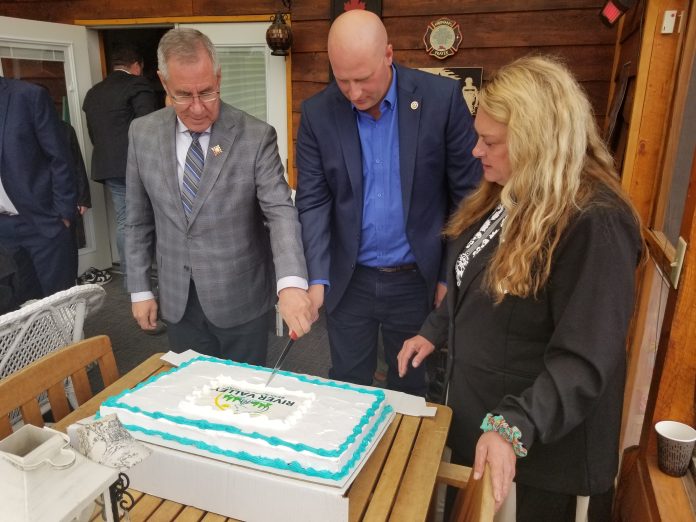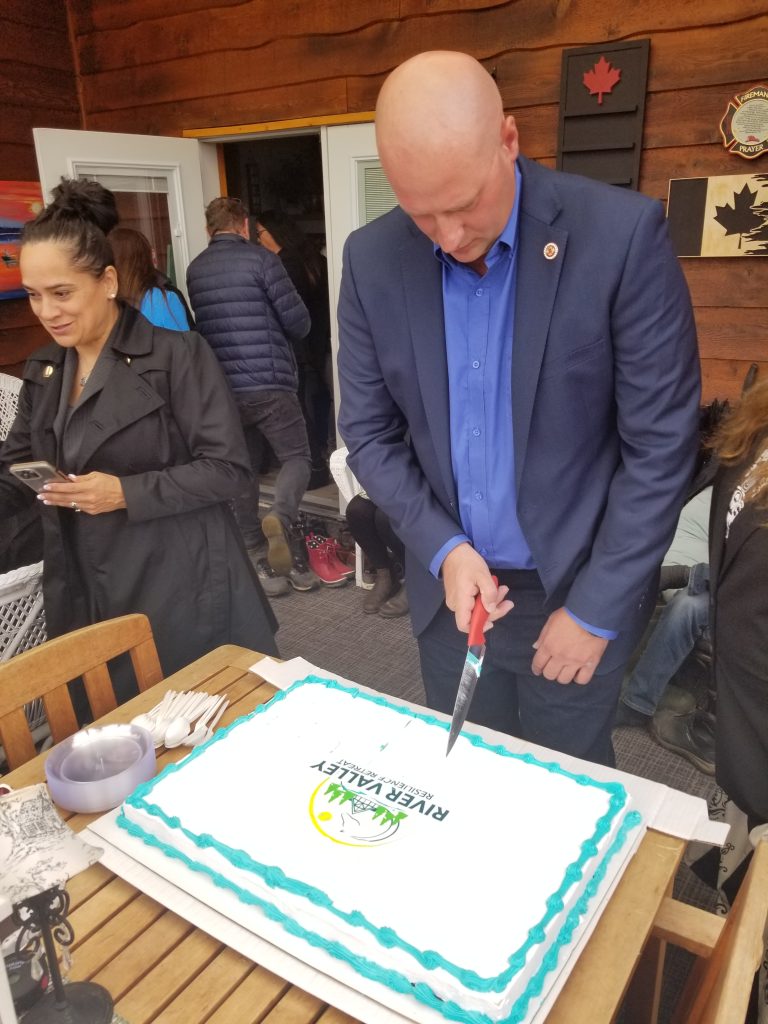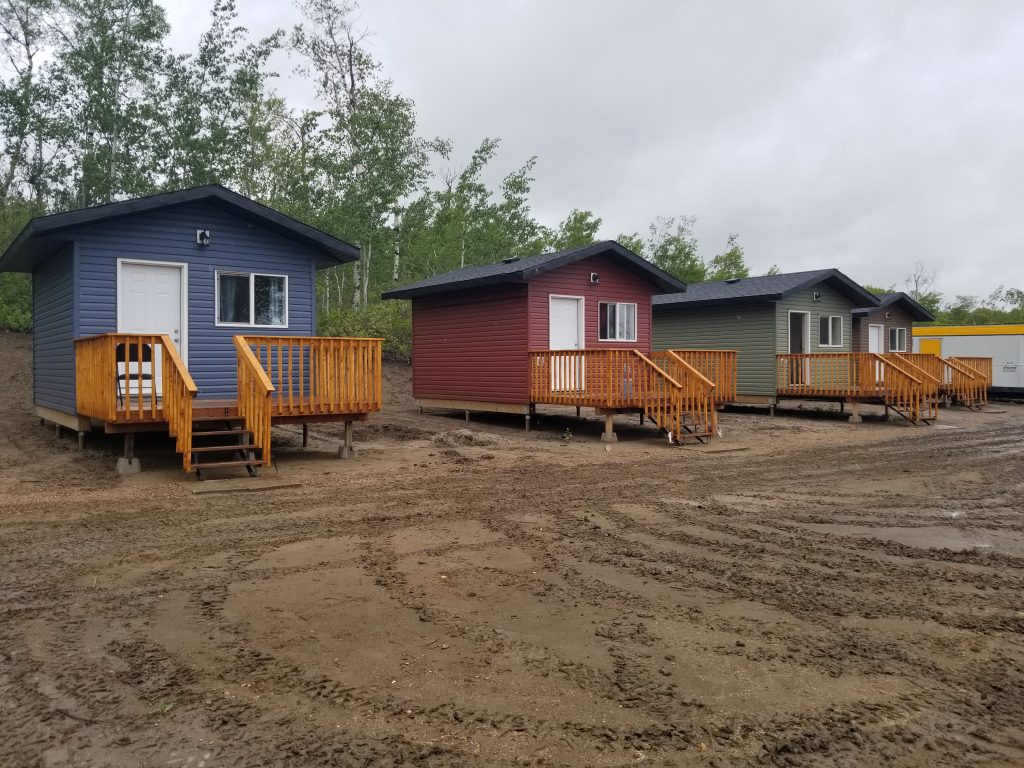
After two years of cleaning, renovating, and building, the River Valley Resilience Retreat (RVRR) is ready to celebrate
The local non-profit was founded in 2019, but didn’t open their current home south of Prince Albert until 2022. On Wednesday, June 5, they commemorated two years at that location with a special ceremony attended local first responders and Lt.-Gov. Russ Mirasty.
“It’s extremely rewarding and an honour,” said Prince Albert Firefighter Jeff Reeder. “It’s a lot of hard work that’s got us to this point. It’s exciting to get out of the planning stages and into the doing stages.”
Reeder co-founded the RVRR with social worker and corrections officer Michelle McKeaveney with the goal of creating a permanent, year-round, safe and secluded space for Public Safety Personnel (PSP) and veterans to rest, relax, and health from Post-Traumatic Stress Disorder (PTSD) and Operational Stress Injury (OSI).
Since taking over the property, Reeder said it’s been “all hands on deck” to get the facility up and running. That includes building five new cabins, which allowed RVRR to host their first full weekend in May.

Prince Albert firefighter and River Valley Resilience Retreat co-founder Jeff Reeder carves up the cake during the non-profit’s second anniversary celebration.
Reeder said they still have other projects in the works—the biggest being the construction of an expanded workshop and new all-weather washroom facilities—but it was important to recognize how far they have come.
“We don’t often take a minute to enjoy or revel in our achievements,” he said. “Today just cements the fact that we have done a lot in the last two years and we’re proud of what we have accomplished here.”
Lt.-Gov. Russ Mirasty was one of several dignitaries on hand to celebrate the occasion. As a 36-year veteran of the RCMP, Mirasty said there was a significant need for an organization like RVRR. When offered the chance to see it first hand, there was no hesitation.
“I’ve seen what OSI and PTSD can do, even to a close family member in particular, and I always felt there were better ways to deal with it that we did in the past, so it was a pleasure to come out,” he said.
“It’s a great facility. I’ve heard of it from its inception, but never had an opportunity to come out here, and been looking forward to coming here to see what it was all about and hear what it was all about,” he added.
Mirasty said there were signs PTSD and OSI were problems for officers when he first joined the RCMP. At the time, he said many people weren’t sure how to deal with it.
Some officers threw themselves into health activities like exercise or sports, he explained while others resorted to drinking. Mirasty said RCMP members always knew there was a better way to deal with the problem, but were unsure where to begin.
He said talking about mental health issues in public has helped drive the conversation forward to the point where facilities like RVRR are welcomed.
“That was probably the best thing that happened, that awareness and then talking about it openly, and trying to remove some of that stigma,” he said. “Sometimes people (had that), ‘well, you’re a police officer, you’re tough, just grin and bear it’ kind of attitude, and we knew that wasn’t working. Now there’s a recognition of it.”
RM of Prince Albert Reeve Eric Schmalz was also on hand for the celebration. As reeve, he’s incredibly proud to have something like RVRR in the area. As a former RCMP officer with 14 years of experience, he said the space is vital.
“The attitude and the knowledge and the recognition of OSI were in their infancy,” said when asked about his time in the RCMP. “They were starting to recognize that there was a problem.”
Schamlz said first responder organizations were always quick the problems OSI and PTSD were creating in their members, especially compared to other organizations, like the Canadian Armed Forces. However, once they did, Schmalz said they services and supports they provided helped keep RCMP officers and other emergency service personal in their field longer.
He said facilities like RVRR are a big part of that support, and he glad to see them setup shop in the RM.

The River Valley Resilience Retreat recently finished construction on five new cabins, allowing them to host their first full weekend retreat in May.
“It’s a great source of pride,” Schmalz said. “There’s no facility like this in Western Canada, possibly not even in the entire nation…. This essentially sets the mould for other organizations to setup operations like this in other provinces and communities to be able to help treat and rehabilitate people who have suffered OSI.”
Wednesday’s celebration also served as the official launch of PTSD Awareness Month in Saskatchewan. Since opening two years ago, Reeder said he’s seeing more and more first responders ask for help. Their goal now is to get them reaching out sooner.
Reeder said it’s common for first responders to show symptoms in the days following a traumatic event, but if those symptoms continue for four to six weeks afterwards, they need to reach out for help.
“You don’t have to bring everything home,” he said. “Know who to turn to if you do have some struggles, and know that we’re here.”
